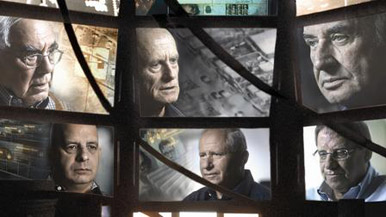Movie Review: The Gatekeepers
By Matthew Huntley
January 17, 2013
The Israeli-Palestinian conflict has waged on for so long that the reasons why the two groups continue to fight have become a bit hazy. To most people, the feud boils down to a vicious cycle of “They hit us, so we hit them back,” and either group could be “they” or “them.” Deep down, of course, we know it’s not that simple and there exists a sad, detailed history for why the violence persists.
The Gatekeepers, an informative and often compelling documentary by Dror Moreh, presents this history solely from an Israeli point-of-view, although it doesn’t necessarily take Israel’s side. In fact, it’s hardly shy about condemning the Israel government for some of its reprehensible actions over the past 50 years. To the film, what’s done is done; it simply argues it should be done no more. Through the testimonies of six men, all of whom served as head of security for Shin Bet, Israel’s Secret Service, the film presents its case, which, essentially, is that violence begets violence and ultimately leads nowhere. Such a notion seems so practical and easy to comprehend, but if it was like that in reality, documentaries like The Gatekeepers would have no reason to be made.
As the heads of Shin Bet, the six interviewees’ chief job was to oversee Israel’s war-on-terror, a concept that’s so common in this post-9/11 era but was relatively new to Israel when it first became a state in 1948. It gained greater traction following the Six Day War in 1967 when Israel re-took the Sinai Peninsula from Egypt and Syria and began its occupation of the West Bank, Gaza and Golan Heights, placing nearly one million Palestinian Arabs under direct Israeli control, a responsibility the state was not ready to handle. Naturally, Palestinian revolts and uprisings ensued, sparked not only by the ramifications of the war but also by religious differences. Of course, I’m just skimming the surface for why the two groups found themselves at odds, but the point is that following the war, Israel had an immense burden on its hands: to implement and maintain peace and it was Shin Bet’s job to carry it out. As the documentary shows, the organization did not always choose the best courses of action.
Though the film’s structure is rather traditional, its content is striking. Each man recollects the major points of his career, which he seems to view more as a failure than a success, which is understandable given the overwhelming circumstances and expectations of his duty. What they all express in their candid interviews is a sense of regret and it’s clear if they could go back and do things differently, they would.
Moreh opens the film in appropriate fashion by immediately de-mystifying the idea that a career in security and anti-terrorism is exciting or thrilling like we’ve come to expect from the movies and television. Yuval Diskin is the youngest Gatekeeper and served as Shin Bet’s deputy director from 2005-2011. He emphasizes that planning for a “targeted assassination,” a principle he’s been credited with initiating and perfecting, is very different from actually executing it. From this point on, we realize the stories of violence we’re about to hear are indeed very real and frightening.
More frightening, perhaps, is the idea that those who order or carry out such attacks become desensitized to them and no longer question their own morals or methods. It’s not until after they retired do they realize what they did. That’s the impression we get from Avraham Shalom (1980-1986), the eldest of the group who began his career in a paramilitary unit that formed the basis of the Israel Defense Force (IDF) and later joined Shin Bet just as it was being formed in the early 1960s. He became head of the organization in 1980 and recalls fighting terrorism instigated by both Palestinians and fundamentalist Jews.
Continued:
1
2
|
|
|
|




